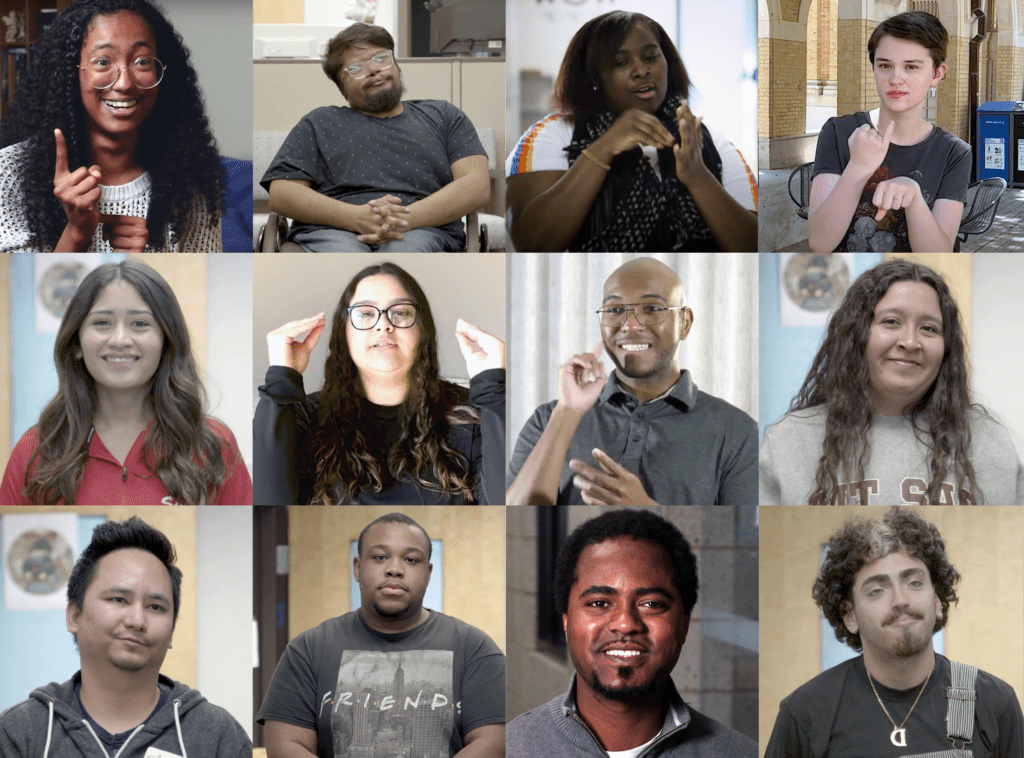Graduate Student Resource Portal

Are you thinking about graduate school? Or maybe you’re about to start? If so, you’re not alone! More deaf students are enrolling in graduate programs each year. Getting a master’s degree or higher can help you earn more money and open up more career opportunities. On average, deaf people with a master’s degree or higher […]
Self-Determination
Since there are many barriers to postsecondary success, it is important that deaf students have an opportunity to practice and develop self-determination skills. For all students with disabilities, self-determination skills have been proven to be an important predictor of outcomes after high school. On this page, we share resources for parents, teachers, and transition specialists […]
Key Impact Areas
Instructional Design & Accessibility Promoting High Expectations for Success Collecting and Using Data for Decision-Making Leveraging Community Resources Developing Collaborative and Integrated Systems Compared to deaf people without a college degree1,2,3, deaf college graduates have greater career mobility, enhanced earnings, and an increased likelihood of stable employment. Deaf people who have not completed postsecondary education […]
Root Causes of Gaps in Postsecondary Outcomes of Deaf Individuals

A review of current postsecondary outcomes for deaf1 people may seem disheartening, with significant educational attainment and employment gaps between deaf and hearing people. Across the nation, only 48% of deaf people are employed, compared to 72% of hearing people2. Furthermore, only 18% of deaf people receive bachelor’s degrees, compared to 33% of hearing people3, which is a critical concern given that […]
How to File a Complaint
Getting effective accommodations should be a smooth process. You make the request, the accommodations are provided, and the accommodations work for you. But sometimes, the process is not smooth, and you don’t get what you need. As a deaf student, you have the right to file a complaint (sometimes called a grievance) if you do […]
Transforming Your Institution: The How and Why
Deaf people often encounter barriers in education, training, and employment settings. A systems perspective can help reduce or eliminate these barriers by addressing underlying root causes of problems to create solutions that will make a lasting impact and create sustainable solutions. A systems transformation framework asks us to change our perspective: focusing on isolated issues → improving […]
Access, Belonging, and Affirmation

Deaf Postsecondary Access and Inclusion Scale 2022–2023 Authors: Jeffrey Levi Palmer, Carrie Lou Bloom, Lore Kinast, and Tia-Nikki Ivanko During the 2022–2023 academic year, NDC surveyed deaf students in higher education institutions across the nation. This report provides a comprehensive overview of survey results and offers suggestions for improving access and inclusion for deaf students on campus. […]
Sustainable Recruitment and Retention Strategies for Sign Language Interpreters & Captionists
Ensuring equitable and accessible experiences in education and training settings for deaf people includes having a qualified pool of providers. Since the COVID-19 pandemic, colleges have been experiencing provider shortages, as well as, struggling to recruit and retain qualified providers. Knowing this, there are still many opportunities to grow and maintain provider pools. Whether you […]
2018-2019 Deaf College Student National Accessibility Report

ACCESS Is More Than Accommodations Authors: Jeffrey Levi Palmer, Stephanie W. Cawthon, Carrie Lou Garberoglio, and Tia Ivanko This is an overview of the experiences of deaf college students in the 2018-2019 academic year. For more current information, visit the Deaf Postsecondary Access and Inclusion Survey page. Download the Full Report Recommended Citation Palmer, J. L., […]
Resources for Deaf Students

Deaf students face barriers and challenges daily as a result of barriers within systems. The impact is that 23% of deaf youth aged 16-24 aren’t in school or working. NDC is committed to changing that by partnering with entities providing information and resources to help improve systems.
Protected: Remote Speech-to-Text Services

There is no excerpt because this is a protected post.
Video Remote Interpreting
Video Remote Interpreting (VRI) is a service used when the interpreter and the deaf person are in different locations. Using high-speed internet and either software or web-based platforms, the interpreter can access consumers via video and audio feeds. People can then communicate with the interpreter via their own devices, such as a laptop, tablet, or […]





